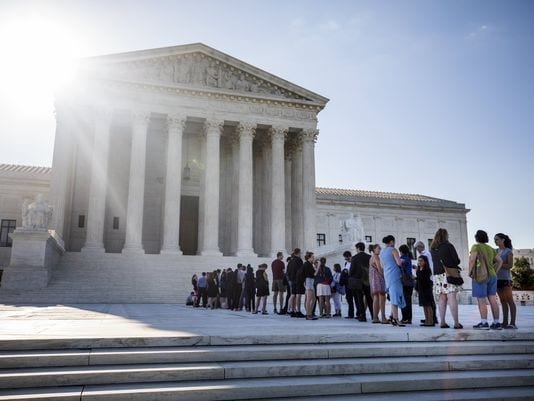With President Trump’s travel ban due to be judged by the Supreme Court in less than a month, the battle to establish certain facts and limitations at the lower federal and preparatory level is aggressively expanding.
Immigration and civil rights advocates have begun writing to the justices, arguing that the intent of the travel ban is inherently unconstitutional.
Ever since the first travel ban was authorized by President Trump in January, critics of the measure have blasted it for being blatantly biased against Muslim would-be migrants and refugees. While the first executive action was quickly shot down by federal courts, the second rendition has existed in a strange sort of limbo since an injunction was lifted by the Supreme Court in summer.

Justices from the 9th Circuit of Appeals, as well as civil liberties and immigrant rights groups, have pointed to President Trump’s campaign-trail statements and Tweets as evidence of an anti-Muslim bias underlying the travel ban.
“Plaintiffs and the rest of the country cannot close their eyes to the president’s condemnation of Islam; this court should not either,” wrote the American Civil Liberties Union (ACLU) in court papers.
Separately, Justice Department lawyers are busy working against a lower court decision to allow refugees with ties to resettlement agencies to continue entering the country.
When the Supreme Court partially lifted an injunction against the travel ban in summer, the justices stipulated that individuals with a “bona fide relationship” to the United States should not arbitrarily be denied visas or entry to the United States.
However, the Supreme Court passed the onus to define what constitutes a “bona fide relationship” to the United States to a lower appeals court, which defined a “bona fide relationship” to include the grandparents of U.S. citizens and residents as well as refugees with placement promises from resettlement agencies.
The Justice Department is also challenging the assertion that Trump’s campaign-trail remarks are even remotely relevant to the case.
After the first travel ban was stricken down, President Trump consulted legal help to ensure that a second executive order would be more likely to pass legal muster.
Among other changes, the list of ‘banned’ countries dropped from seven to six. Iraq was removed from the list after Baghdad petitioned the U.S. government extensively.
The agency’s attorneys have taken up and defended the stance that the intent of both executive orders is solely to protect national security from the residents of purportedly ‘terror-prone nations.’
Sources
Battle over Trump’s immigration travel ban escalates
Trump travel ban back in court Monday
Trump’s New Travel Ban Blocks Migrants From Six Nations, Sparing Iraq
US President Donald Trump signs new travel ban, exempts Iraq


Join the conversation!